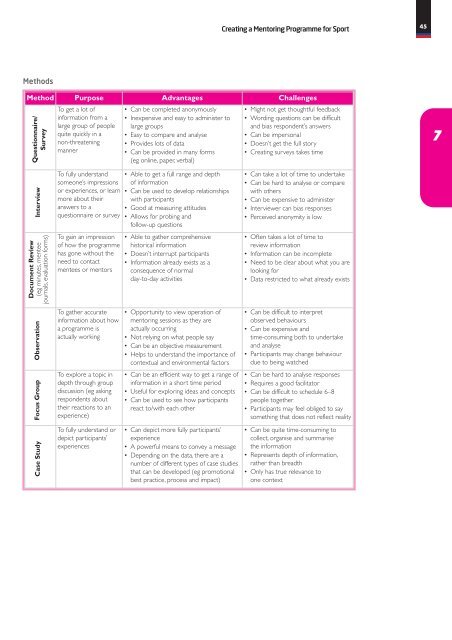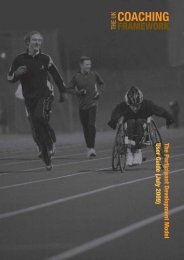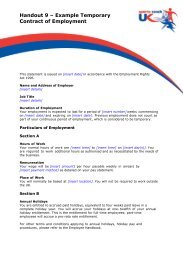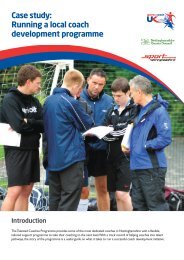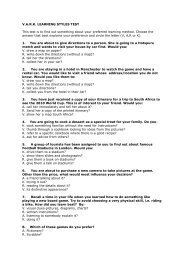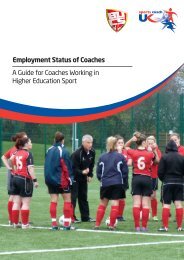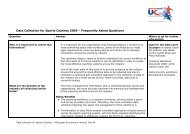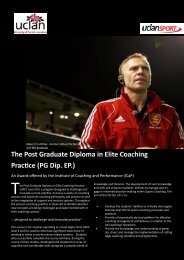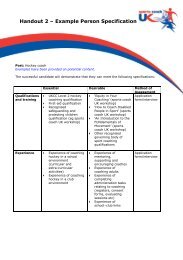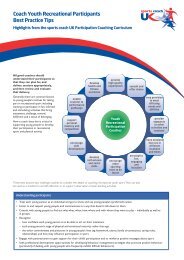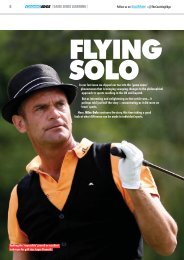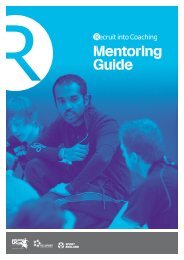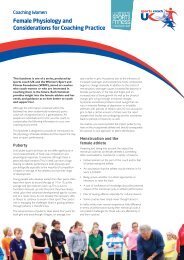Creating a Mentoring Programme for Sport: A ... - sports coach UK
Creating a Mentoring Programme for Sport: A ... - sports coach UK
Creating a Mentoring Programme for Sport: A ... - sports coach UK
You also want an ePaper? Increase the reach of your titles
YUMPU automatically turns print PDFs into web optimized ePapers that Google loves.
<strong>Creating</strong> a <strong>Mentoring</strong> <strong>Programme</strong> <strong>for</strong> <strong>Sport</strong>45MethodsMethod Purpose Advantages ChallengesQuestionnaire/SurveyTo get a lot ofin<strong>for</strong>mation from alarge group of peoplequite quickly in anon-threateningmanner• Can be completed anonymously• Inexpensive and easy to administer tolarge groups• Easy to compare and analyse• Provides lots of data• Can be provided in many <strong>for</strong>ms(eg online, paper, verbal)• Might not get thoughtful feedback• Wording questions can be difficultand bias respondent’s answers• Can be impersonal• Doesn’t get the full story• <strong>Creating</strong> surveys takes time7InterviewDocument Review(eg minutes, menteejournals, evaluation <strong>for</strong>ms)To fully understandsomeone’s impressionsor experiences, or learnmore about theiranswers to aquestionnaire or surveyTo gain an impressionof how the programmehas gone without theneed to contactmentees or mentors• Able to get a full range and depthof in<strong>for</strong>mation• Can be used to develop relationshipswith participants• Good at measuring attitudes• Allows <strong>for</strong> probing andfollow-up questions• Able to gather comprehensivehistorical in<strong>for</strong>mation• Doesn’t interrupt participants• In<strong>for</strong>mation already exists as aconsequence of normalday-to-day activities• Can take a lot of time to undertake• Can be hard to analyse or comparewith others• Can be expensive to administer• Interviewer can bias responses• Perceived anonymity is low• Often takes a lot of time toreview in<strong>for</strong>mation• In<strong>for</strong>mation can be incomplete• Need to be clear about what you arelooking <strong>for</strong>• Data restricted to what already existsObservationFocus GroupCase StudyTo gather accuratein<strong>for</strong>mation about howa programme isactually workingTo explore a topic indepth through groupdiscussion (eg askingrespondents abouttheir reactions to anexperience)To fully understand ordepict participants’experiences• Opportunity to view operation ofmentoring sessions as they areactually occurring• Not relying on what people say• Can be an objective measurement• Helps to understand the importance ofcontextual and environmental factors• Can be an efficient way to get a range ofin<strong>for</strong>mation in a short time period• Useful <strong>for</strong> exploring ideas and concepts• Can be used to see how participantsreact to/with each other• Can depict more fully participants’experience• A powerful means to convey a message• Depending on the data, there are anumber of different types of case studiesthat can be developed (eg promotionalbest practice, process and impact)• Can be difficult to interpretobserved behaviours• Can be expensive andtime-consuming both to undertakeand analyse• Participants may change behaviourdue to being watched• Can be hard to analyse responses• Requires a good facilitator• Can be difficult to schedule 6–8people together• Participants may feel obliged to saysomething that does not reflect reality• Can be quite time-consuming tocollect, organise and summarisethe in<strong>for</strong>mation• Represents depth of in<strong>for</strong>mation,rather than breadth• Only has true relevance toone context


